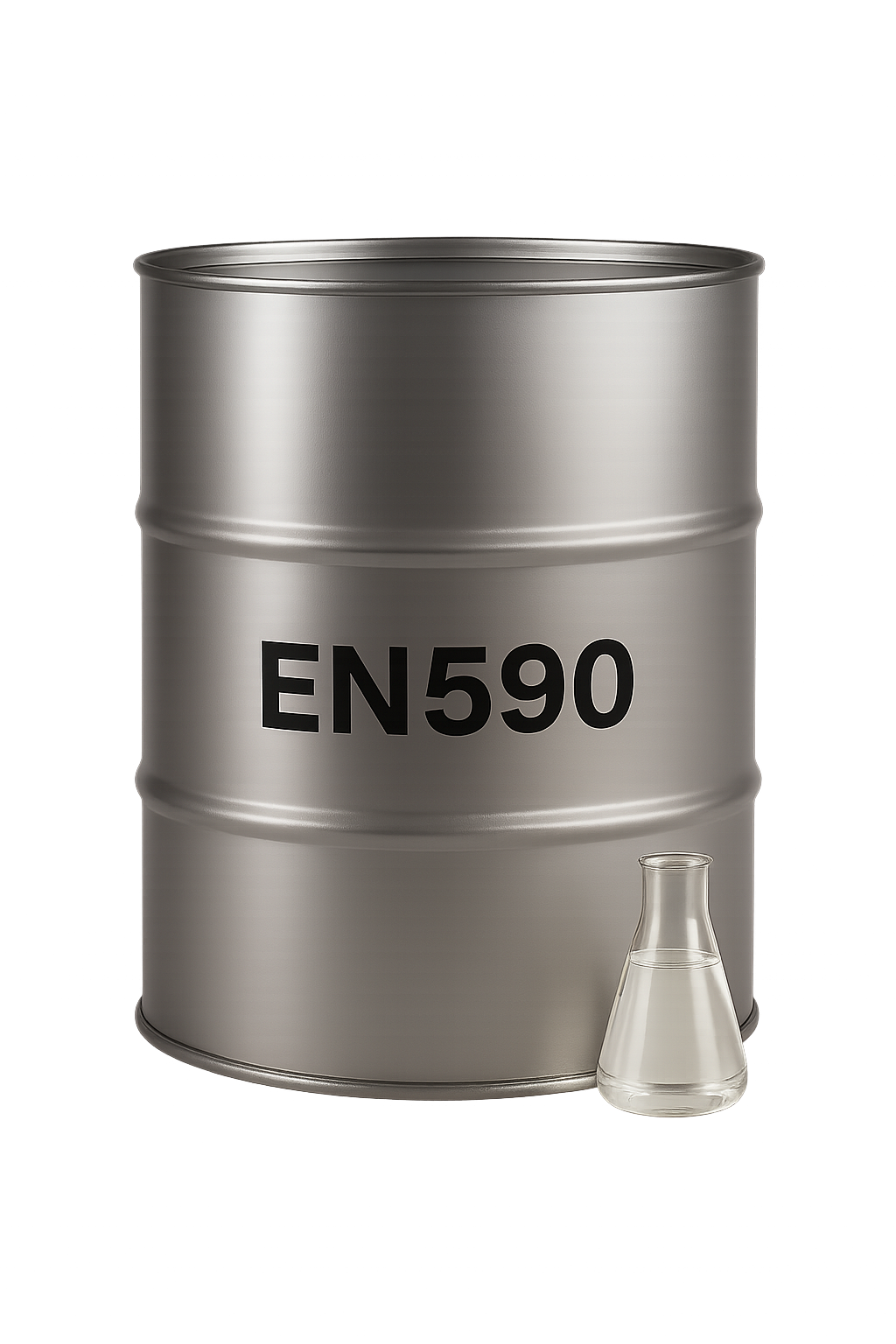
EN590
Overview
EN590 is the European standard specification for automotive diesel fuel. It defines the properties required for diesel engines to operate efficiently while meeting stringent emissions standards. EN590 diesel is an ultra-low sulfur fuel (maximum 10 parts per million sulfur) designed to reduce harmful emissions, improve engine performance, and comply with Euro V and Euro VI environmental regulations.
Technical Characteristics
- Grade: EN590 ULSD (10 ppm sulfur)
- Appearance: Clear or light yellow liquid
- Density @ 15°C: 0.820–0.845 kg/L
- Cetane Number: Minimum 51 (ASTM D613 / EN ISO 5165)
- Sulfur Content: Maximum 10 mg/kg (10 ppm)
- Flash Point: Minimum 55°C (EN ISO 2719)
- Viscosity @ 40°C: 2.0–4.5 mm²/s (EN ISO 3104)
- Cold Filter Plugging Point (CFPP):
- Summer Grade: 0°C max
- Winter Grade: −20°C max (region dependent)
- Polycyclic Aromatic Hydrocarbons (PAH): ≤ 8% by mass
- Lubricity (HFRR @ 60°C): ≤ 460 µm wear scar diameter
Specifications & Standards
- European Standard: EN590 (latest revision)
- Environmental Compliance: Euro V and Euro VI engine standards
- Compatible with B7 biodiesel blends (up to 7% FAME by volume)
Applications
- Automotive Fuel: Primary diesel for passenger cars, trucks, and buses
- Construction & Agriculture: Used in heavy machinery and equipment
- Transport & Logistics: Standard fuel for road freight across Europe and globally
- Marine Use (Inland): Approved for certain low-sulfur inland vessels and equipment
Performance Advantages
- Ultra-Low Sulfur: Reduces particulate and sulfur oxide emissions
- High Cetane Rating: Ensures cleaner ignition and efficient combustion
- Engine Protection: Meets lubricity requirements to reduce wear in fuel injection systems
- Cold Weather Adaptation: Available in seasonal grades to prevent waxing in low temperatures
Handling & Storage
- Store in clean, sealed tanks to prevent contamination and water ingress
- Requires monitoring of CFPP depending on seasonal supply conditions
- Compatible with modern after-treatment systems (DPF, SCR, EGR)
Compliance & Testing
- Verified against EN590, ASTM D975, and ISO standards
- Typically supplied with third-party inspection certificates (SGS, CIQ, Intertek) confirming quality and quantity
Frequently Asked Questions
1. lobortis augue porta eu. Maecenas eget mauris tristique ?
Praesent aliquet et quam at tempus. Orci var natoque penati magnis disw parturien monascetur ridiculus condimentum pharetra interdum.
2. Sobortis augue porta eu. Maecenas eget mauris tristique ?
Praesent aliquet et quam at tempus. Orci var natoque penati magnis disw parturien monascetur ridiculus condimentum pharetra interdum.
3. Cobortis augue porta eu. Maecenas eget mauris tristique ?
Praesent aliquet et quam at tempus. Orci var natoque penati magnis disw parturien monascetur ridiculus condimentum pharetra interdum.
4. Dobortis augue porta eu. Maecenas eget mauris tristique?
Praesent aliquet et quam at tempus. Orci var natoque penati magnis disw parturien monascetur ridiculus condimentum pharetra interdum.
5. Dobortis augue porta eu. Maecenas eget mauris tristique?
Praesent aliquet et quam at tempus. Orci var natoque penati magnis disw parturien monascetur ridiculus condimentum pharetra interdum.
6. Dobortis augue porta eu. Maecenas eget mauris tristique?
Praesent aliquet et quam at tempus. Orci var natoque penati magnis disw parturien monascetur ridiculus condimentum pharetra interdum.